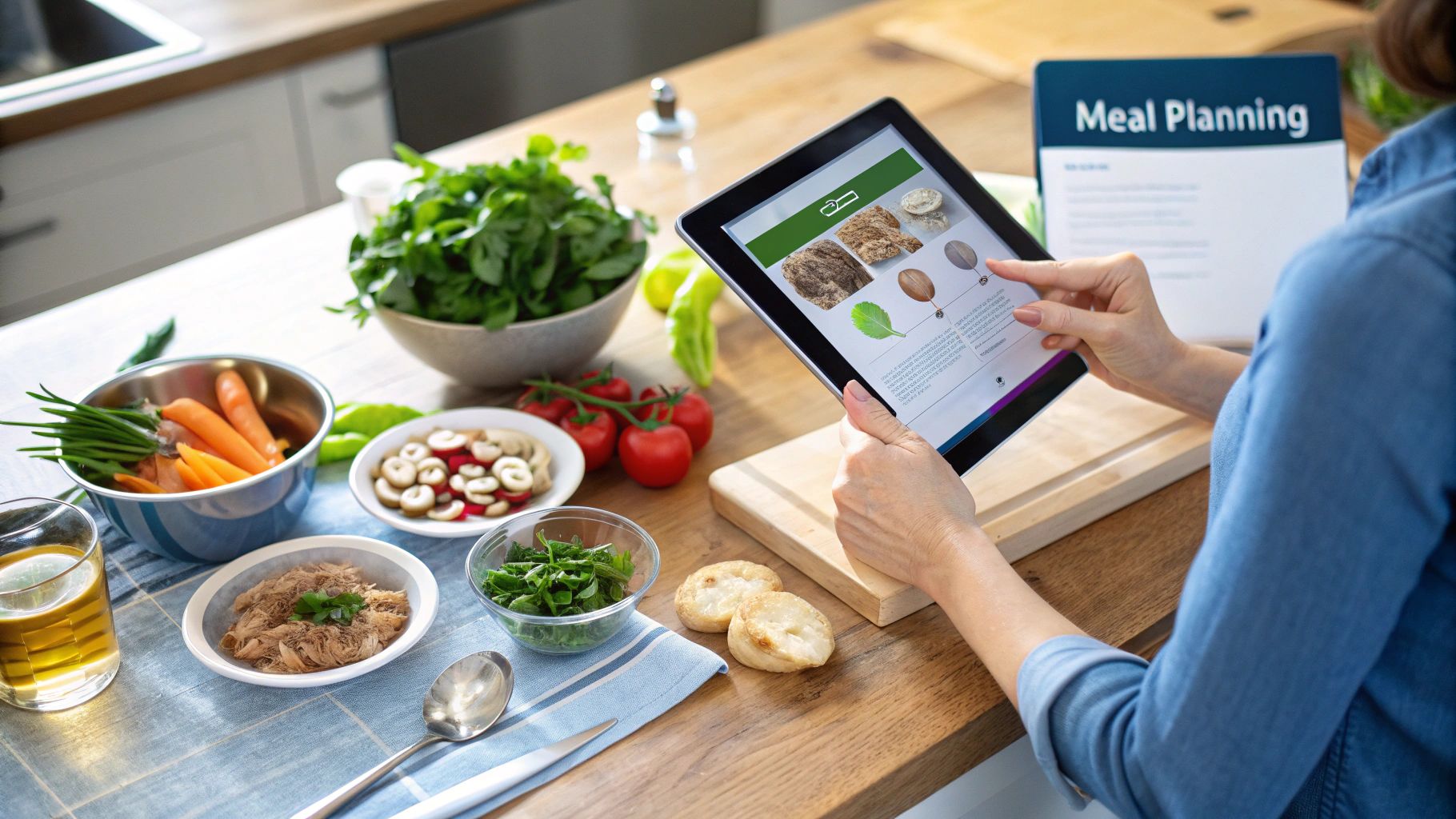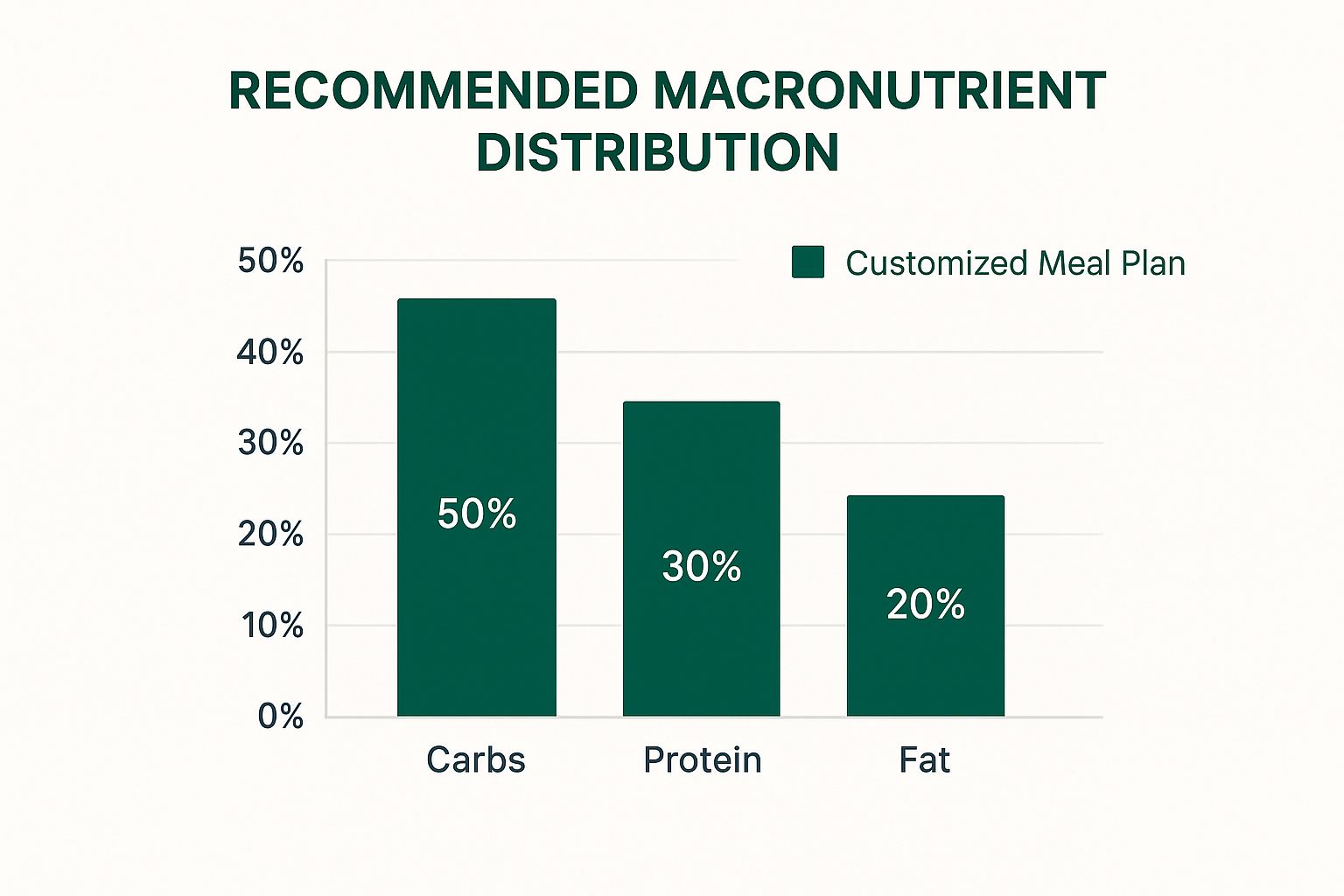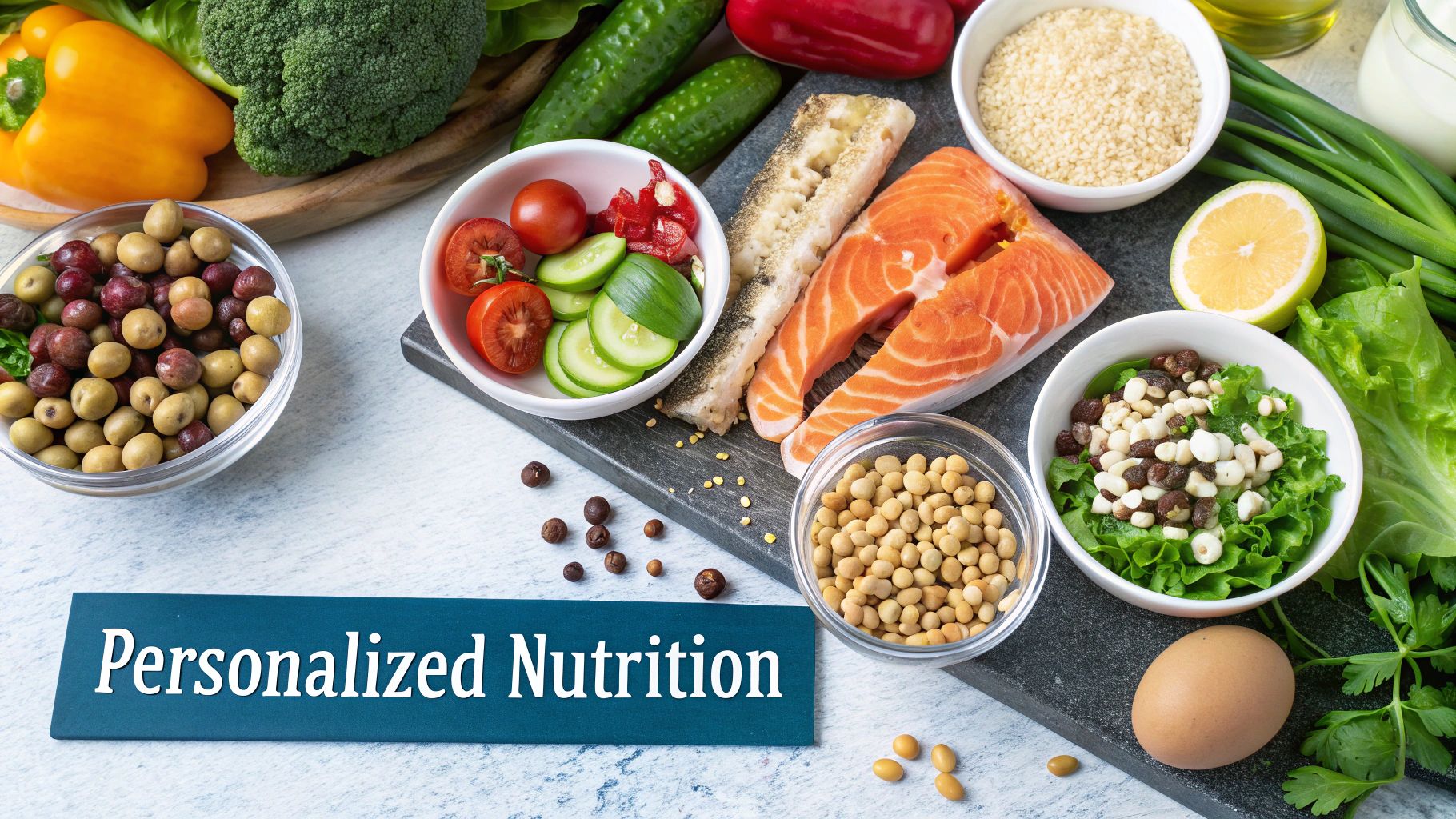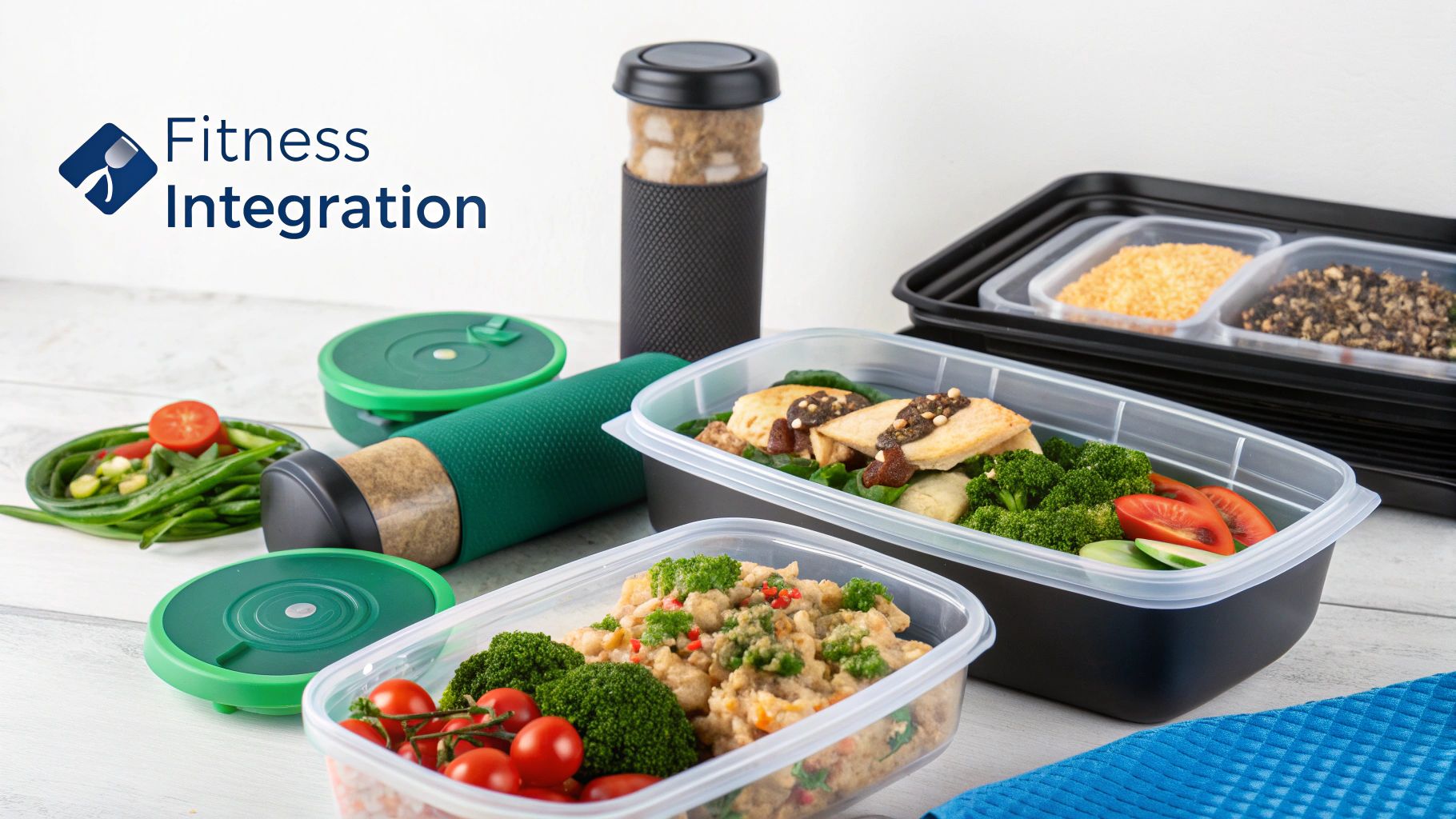Boost Your Nutrition with a Customized Meal Planner
Transform your health with a customized meal planner. Discover expert tips to create personalized plans that deliver real results. Click to learn more!
Love This Article?
Get personalized meal plans with recipes like this, automatically matched to your nutrition targets.

Boost Your Nutrition with a Customized Meal Planner
Why Customized Meal Planners Are Changing the Nutrition Game
Generic meal plans? Yeah, they often miss the mark. Why? They just don't consider what you want or need. A plan perfect for one person might be a total disaster for someone else. So, let's dive into the world of customized meal planners and discover why personalization is the secret sauce for nutritional success.
The Power of Personalization
One-size-fits-all nutrition plans? They often fail because they're, well, inflexible. Think about it: a plan demanding strict calorie counting might be impossible for someone with a packed schedule. And if a plan ignores your favorite foods? Diet fatigue sets in, and you're back to square one. Customized meal planners fix these issues by creating plans tailored to your life. This means you're more likely to stick with the plan and actually enjoy healthy eating!
This surge in demand for personalized health solutions is clear in the booming meal planning industry. Get this: the global meal planner market, worth about USD 12 billion in 2024, is predicted to hit a whopping USD 28 billion by 2032. Find more detailed statistics here. Clearly, personalized nutrition is a big deal.
Understanding the Psychology of Success
Crafting a truly customized meal plan takes some serious creativity. Need a creativity boost? Check out these tips: boost creativity. Successful meal planning isn't just about the food; it's about you. Things like emotional eating, cravings, and social situations all affect our food choices. A customized approach tackles these factors head-on, making your plan more sustainable. It's not just about what you eat, but why.
Technology's Role in Transforming Nutrition
Technology has supercharged personalized nutrition with powerful algorithms and data analysis. This means customized meal planners can consider everything from dietary restrictions and allergies to fitness goals and even genetic factors. It's like having a personal nutritionist in your pocket, constantly tweaking your plan just for you!
Real-World Success Through Customization
The proof is in the pudding, as they say. Customized meal planning delivers real results for real people. Imagine: someone with diabetes can enjoy delicious meals while managing their blood sugar. And someone with a gluten intolerance can plan meals without the stress of ingredient hunting. Personalized nutrition is truly empowering.

Essential Features That Make a Customized Meal Planner Worth Using
Finding the perfect meal planner can feel like searching for the Holy Grail. You want something that fits your lifestyle, simplifies cooking, and helps you reach your health goals. With so many options out there, how do you choose? Let's dive into the must-have features that separate the best from the rest.
Personalized Recommendations and Flexibility
A truly customized meal planner should bend to your needs, not the other way around. It all starts with dietary preferences. Whether you're a vegetarian, vegan, or rocking the keto or paleo lifestyle, the planner should offer delicious options that fit your eating style. Handling food allergies and intolerances is also crucial. Nobody wants a meal plan that sends them to the hospital!
And because life is unpredictable, flexibility is essential. This means being able to swap meals, adjust portion sizes, and find substitutions when you're missing an ingredient. It's about making healthy choices without feeling trapped.
Integration and Automation for Efficiency
A great meal planner isn't just personalized; it simplifies your life. Grocery list syncing is a game-changer. Imagine your meal plan automatically creating a shopping list, organized by grocery store aisles! Some advanced planners even integrate with delivery services like Instacart, letting you order groceries with a single click. Talk about automation!
Recipe management is another key integration. Importing your favorite recipes, crafting custom meal plans, and saving shopping lists can streamline your entire cooking process. It turns meal planning from a chore into a smooth part of your week.
User-Friendly Interface and Support
Even the most advanced planner is useless if it's a nightmare to use. A user-friendly interface is a must. Look for intuitive navigation, clear instructions, and a design that’s easy on the eyes. Meal planning should be enjoyable, not a headache!
And when you need help, reliable customer support is a lifesaver. Whether it's a technical issue or a question about your plan, good support makes all the difference. This often separates a truly helpful tool from one that ends up gathering dust in your app drawer. Speaking of apps, AI-driven meal planning apps are booming, especially in North America. In 2024, North America raked in over USD 312.0 million, a whopping 32.1% of the global market share. Explore this topic further.
Data Visualization and Insights
The best meal planners don't just give you meals; they provide insights into your nutrition. Look for features that track calories, macronutrients, and micronutrients. Visualizing this data through charts can be incredibly helpful. For instance, a bar chart showing your weekly protein intake could be just what you need to fine-tune your diet.
To help you understand the features users value most, we've compiled a table summarizing usage rates for popular customized meal planners:
Essential Features of Customized Meal Planners
A comparison of key features across different types of meal planning platforms
| Feature | Basic Planners | Advanced Planners | AI-Driven Planners |
| Recipe Management | Yes | Yes | Yes |
| Grocery List Syncing | Limited | Yes | Yes |
| Dietary Tracking | No | Sometimes | Yes |
| Meal Swapping | Limited | Yes | Yes |
| Delivery Integration | No | Sometimes | Often |
As you can see, core features like recipe management and grocery list syncing are widely used across all platforms. However, advanced and AI-driven planners pull ahead when it comes to dietary tracking, meal swapping, and delivery integration, showing the demand for a more streamlined and automated meal planning experience.
The following data chart visualizes key feature usage rates in customized meal planners based on user surveys.

This chart reveals that recipe management and grocery list syncing are the most popular features, with usage rates of 85% and 78%, respectively. However, there's still a significant opportunity for growth in areas like delivery integration, which sits at 42%.
This kind of data visualization provides valuable insights into user preferences and empowers you to choose a meal planner that truly meets your needs.
The Science Behind Why Personalized Nutrition Actually Works
Personalized nutrition, the very foundation of customized meal planners, goes beyond the usual dietary advice. It offers plans specifically designed for individual needs. Forget one-size-fits-all! This new approach comes from the growing realization that things like our genes, lifestyles, and even our gut bacteria play a big part in how we process food. This cutting-edge science shows why what works for one person might not work for another. It truly highlights the need for personalized plans.
Understanding the Role of Genetics and Individual Biology
Our genes have a say in how we metabolize nutrients. For example, some people process carbs better than others, which affects their ideal macronutrient ratios. Also, factors like age, sex, and how active we are all lead to different nutritional needs. A customized meal planner takes these unique biological differences into account, designing plans that optimize nutrient intake for each person. This tailored approach helps people achieve their own health and wellness goals.
The Impact of Lifestyle Factors on Nutrition
Lifestyle has a significant impact on nutritional needs. A busy stay-at-home parent might need quick and easy meals, while a meal-prepping enthusiast could prefer elaborate recipes. Food preferences and cultural backgrounds also influence what makes a diet satisfying and sustainable. Personalized meal planners consider these lifestyle factors, creating plans that fit seamlessly into a person's daily routine. This practical integration encourages long-term healthy eating habits, moving beyond quick fixes.
The Emerging Science of the Microbiome
Research on the microbiome, the community of bacteria in our gut, shows its massive influence on digestion and overall health. Different microbiomes react differently to different foods. This unique response highlights how improving gut health through personalized nutrition can have a powerful impact on well-being. New research in this area is changing how we think about food, moving away from general advice to targeted plans that nourish both the person and their specific microbiome.
Addressing Contradictory Nutrition Advice
So much conflicting nutrition advice exists because of a lack of personalization. What might be good for one group, based on average research, could be bad for another. Customized meal planners address this by offering guidance based on individual needs. This approach recognizes the complexity of human biology and how limited general recommendations can be. It also emphasizes the importance of personalized nutrition plans. This guidance empowers individuals to make smart food choices that match their specific health goals.

The personalized nutrition market is booming! In 2024, this market was valued at USD 16.61 billion, and it's expected to hit USD 19.2 billion in 2025, showing a CAGR of 15.6%. Want more stats? Check them out here: https://www.thebusinessresearchcompany.com/report/personalized-nutrition-global-market-report
Finding Your Perfect Customized Meal Planner Match
So, you're ready to dive into the world of customized meal planning? Fantastic! But with so many options out there, picking the right one can feel like trying to find a needle in a haystack. Fear not, intrepid foodie, this guide is here to help you find the perfect meal planner soulmate. We'll unpack some crucial considerations—things you might not have even thought of—from finicky dietary needs to syncing with your go-to apps. By getting the inside scoop and learning from others' experiences, you'll be whipping up meal plans like a pro in no time.
Key Considerations for Choosing a Customized Meal Planner
Choosing a meal planner is a bit like dating—you need to find one that’s compatible with your lifestyle. First up: dietary specialization compatibility. If you're rocking a specific diet like vegetarian, keto, or paleo, make sure your planner can handle it. And if you have allergies? Making sure the planner can exclude those ingredients is absolutely essential.
Next, let's talk user experience. Is the platform as smooth as butter or clunky and confusing? Nobody wants a complicated interface. A clean design and easy-to-use features are a must. You should be enjoying the process, not pulling your hair out!
Now, think about your current kitchen arsenal. Does the planner play nice with your favorite recipe apps or grocery delivery services? Seamless integration with tools like Instacart can make your life a whole lot easier. Imagine: automated grocery lists, delivered right to your door. Meal planning bliss!
Last but not least, how much control do you want? Can you tweak portion sizes, swap out meals that don’t tickle your fancy, and add your own culinary masterpieces? A truly customized planner puts you in the driver's seat.
Matching Your Needs to the Right Planner Type
Just like there's no one-size-fits-all diet, there's no one-size-fits-all meal planner. Different planners cater to different needs and preferences. To help you find your perfect match, we've put together this handy comparison guide:
To help you navigate the world of meal planners, let's take a look at a comparison of different types:
Customized Meal Planner Comparison Guide: A comparison of different meal planner types based on user needs and preferences
| User Need | Best Planner Type | Key Benefits | Potential Limitations |
| Specific Dietary Needs | Specialized Diet Planner | Caters to restrictions, offers targeted recipes | May be less flexible for varied tastes |
| Time-Saving Automation | AI-Driven Planner | Automates grocery lists, suggests substitutions | Requires trust in the algorithm, some errors may occur |
| Flexibility and Control | Highly Customizable Planner | Allows meal swapping, portion adjustments | Can take a bit of time to set up initially |
| Beginner-Friendly Approach | Simple Interface Planner | Easy to learn, intuitive to use | May lack advanced bells and whistles |
As you can see, choosing the right planner depends entirely on your individual needs and preferences. Consider what is most important to you – whether it’s catering to specific dietary needs or having maximum flexibility.
User Testimonials and Real-World Experiences
Before you swipe right on a meal planner, it’s always a good idea to check out the reviews. What are other users saying? Look for testimonials that spill the tea on both the good and the bad. A busy parent might love the time-saving magic of an AI-powered planner, while a meal-prep pro might prefer the flexibility of a highly customizable option. Real-world perspectives offer a glimpse beyond the marketing hype.
By weighing these factors and doing your research, you can find a customized meal planner that truly fits your lifestyle and helps you reach your health goals. It's all about finding a tool that empowers you to take control of your nutrition in a way that's manageable, enjoyable, and, most importantly, personalized. Happy planning!
Building Sustainable Habits With Your Meal Planner

A customized meal planner, like Meal Flow AI, has amazing potential to boost your nutrition. But its real magic? Helping you build healthy habits that actually stick. This section dives into how to make a customized meal planner a natural part of your life, turning meal planning from a dreaded chore into a breeze.
Overcoming Planning Fatigue
Let's be honest, planning fatigue is real. That initial excitement about meal planning can fade fast, especially when life gets hectic. The trick? Start small. Pick just one or two meals a week to plan with your customized meal planner. As you get the hang of it, gradually add more. Think of it like training for a marathon—you wouldn't try to run 26 miles on day one! This progressive implementation builds confidence and prevents you from feeling overwhelmed.
Maintaining Flexibility for Social Occasions
Life is full of surprises! Dinners with friends, parties, and holidays can throw off even the most organized meal plans. The key to long-term success is flexibility. A good customized meal planner, like Meal Flow AI, lets you easily swap meals or adjust portions to fit those social gatherings. This adaptability means your meal planner works with your life, not against it.
Adapting to Seasonal Changes
Our tastes change with the seasons, and so does what’s available at the market. A smart customized meal planner rolls with those changes. In the summer, it might suggest lighter meals with fresh produce. Come winter, it could recommend cozy, warming dishes. This seasonal awareness keeps your meals exciting and in tune with what your body craves year-round.
Integrating Batch Cooking and Meal Prepping
Want to supercharge your customized meal planner? Batch cooking and meal prepping are your secret weapons. Meal Flow AI, for example, automatically generates Instacart shopping lists based on your selected meals. This makes it easy to grab everything you need for a week's worth of meals at once. Then, carve out a few hours on the weekend to prep key components like grains, proteins, and chopped veggies. This turns your meal plan into a set of ready-to-assemble meals, saving you time and stress during the week.
Setting Realistic Expectations and Celebrating Small Wins
Be patient! Building lasting habits takes time and effort. You won't become a meal-planning master overnight. Focus on small, achievable goals. Did you plan and cook three dinners this week? That's a win! Celebrate it! These small victories reinforce positive behavior and keep you motivated. Over time, those small steps will lead to big, lasting changes in your eating habits. Remember, consistency trumps perfection.
Creating a Holistic System: Meal Planning Plus Other Health Tools
Customized meal planning truly shines when it works hand-in-hand with your other wellness efforts. Think of it like a well-oiled machine: each part plays a vital role, but together, they achieve something amazing. Let's explore how combining a customized meal planner with other health tools creates a powerful synergy for your overall well-being.
Synergizing Meal Planning With Fitness Tracking
Pairing your customized meal planner with a fitness tracker offers incredible insights into your caloric needs. Imagine your tracker reveals you torched 300 calories during a killer workout. Your meal planner can then adjust your daily calorie intake accordingly! This dynamic duo helps you fine-tune your nutrition to crush your fitness goals. Plus, tracking your activity level helps the meal planner recommend the perfect balance of macronutrients, like protein and carbohydrates, to optimize your energy and recovery.
Integrating Sleep Optimization and Stress Management
Did you know nutrition plays a crucial role in both sleep quality and stress management? It's true! A customized meal planner can suggest foods packed with magnesium and tryptophan, known for their relaxation and sleep-promoting properties. By ensuring you get adequate nutrients, your meal planner helps minimize the negative impact of stress on your body. When you're well-nourished, you're a superhero at handling daily stressors and maintaining a balanced mood.
The Power of Data Sharing and Avoiding Pitfalls
Sharing data between your meal planner and other health platforms gives you a deep understanding of your overall health. However, too many apps can lead to data overload. Yikes! Focus on integrating a few key tools that work together seamlessly and provide valuable insights. Instacart integration, where shopping lists are automatically generated based on your chosen meals, is a perfect example of how to streamline this process.
Building Sustainable Healthy Habits
Building sustainable habits is the secret sauce to long-term success with meal planning. For a deep dive into habit formation, check out Atomic Habits. Start small – plan one or two meals a week. Gradually increase the number of meals you plan as you become more comfortable. This gradual approach keeps you from feeling overwhelmed and sets you up for long-term success.
Meal Planning: The Cornerstone of Wellness
Think of your customized meal planner as the cornerstone of your wellness strategy, not just another app. By coordinating your nutrition plan with other health tools and building sustainable habits, you’re creating a holistic system that supports your well-being from all angles. This empowers you to reach your health goals and enjoy a more balanced, fulfilling lifestyle. It’s like having a central command center for your health journey, connecting and optimizing every element. A well-designed meal plan is the foundation for a healthier, more energetic you – ensuring you're not just eating well, but truly living well.
The Future of Personalized Nutrition Technology
The world of customized meal planning is buzzing with exciting new possibilities, all thanks to some seriously cool tech advancements. We're not just talking about picking recipes anymore. This is about taking personalized nutrition to a whole new level! From high-tech gadgets to the magic of Artificial Intelligence (AI), let's explore what the future holds and separate the facts from the science fiction.
Continuous Glucose Monitoring and Meal Planning
Imagine a meal planner that's so smart, it knows exactly how your body reacts to different foods in real time. Continuous glucose monitors (CGMs), originally designed for people with diabetes, are now making waves in the world of personalized nutrition. These clever devices constantly track your blood sugar levels, giving you a detailed picture of how different foods affect you. By connecting this info with customized meal planners, we can create dynamic plans that keep your blood sugar and energy levels perfectly balanced. This real-time feedback could totally change how we think about meal timing and food choices.
Augmented Reality and the Grocery Shopping Experience
Let's face it, grocery shopping can be a drag. But Augmented Reality (AR) is here to rescue us from supermarket boredom. Picture this: you stroll into the store, your customized meal plan synced with your AR glasses, and suddenly, the items on your list are highlighted, practically jumping off the shelves. AR can even guide you through the aisles and offer real-time nutritional info and healthy swaps right there on the spot. Talk about turning a chore into an interactive adventure!
AI-Powered Taste Preference Prediction
Have you ever wished your meal planner could read your mind and know what you're craving before you even do? AI is getting surprisingly close to making that dream a reality. By analyzing your past food choices, dietary preferences, and even your social media activity, clever AI algorithms can predict the flavors and cuisines you'll love. This means meal plans that are not only healthy but also seriously satisfying, making healthy eating a delicious journey, not a dreadful diet.
The Role of Biometric Data and Personalized Recommendations
Blood sugar isn't the only thing that matters. Other biometric data, like heart rate variability and sleep patterns, can offer even deeper insights into your health. Integrating this data with customized meal planners allows for super-personalized recommendations. For example, if your sleep tracker notices you're tossing and turning, your meal planner might suggest magnesium-rich foods to help you relax and catch some Z's. This holistic approach takes a big-picture view of your well-being, optimizing your health from all angles.
Navigating the Future of Personalized Nutrition
While the future of personalized nutrition is incredibly exciting, it's important to approach it with a level head. Technology is a powerful tool, and we need to use it wisely. Data privacy is a huge concern, so make sure you understand how your data is being handled. Also, remember that technology should empower you, not control you. A personalized meal planner should be your helpful guide, not your food dictator.
By staying informed and using these advancements thoughtfully, you can unlock the incredible potential of technology to transform your nutrition journey into something effortless and truly empowering. Take charge of your health and discover the joy of truly personalized nutrition!
Ready to dive into the future of personalized nutrition? Meal Flow AI is an AI-powered meal planning platform that creates customized meal plans and automatically generates Instacart shopping lists for easy grocery delivery. Streamline your entire meal planning process with intelligent automation. Start your personalized nutrition adventure today with Meal Flow AI!